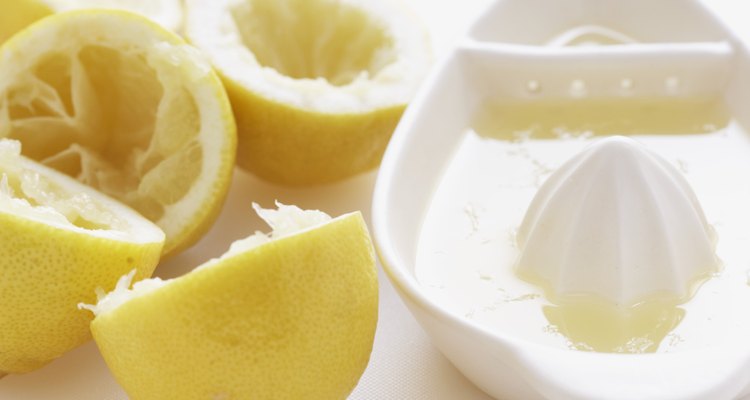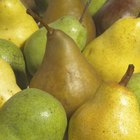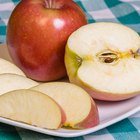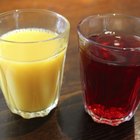
Most plants contain polyphenol oxidase, an enzyme stored in their cells that reacts to the oxygen in the air, a process called oxidation that causes apple flesh to turn brown. The acid in lemon juice interferes with this by stopping the reaction between the two substances. The process is believed to serve as a defense mechanism by discouraging animals and insects from further damaging the plants.
Chemical Reaction
Once added to sliced apples, the ascorbic acid, or vitamin C, in lemon juice creates a barrier between the oxygen and the polyphenol oxidase. Until the lemon juice has evaporated or been completely absorbed, the oxygen reacts with the ascorbic acid, preventing the apple from turning brown. The more acidic a substance is, the more capable it is of preventing apples from turning brown during preparation. Among other characteristics, fruits are categorized by their pH, or acidity, content. The pH of lemon juice is about 2.0, which makes it acidic enough to completely deactivate the polyphenol enzyme.
Methods
To keep just a few apple slices from turning brown until you are ready to use them, brush their cut surfaces with pure lemon juice. If you're preparing a larger number of apples for a pie or for applesauce, soak the slices in a solution made from 1/4 cup of lemon juice and 1 quart of cold water. Increase proportions based on the amount of apples, because you want to keep them completely submerged in the solution until you are ready to use them. Soak them for about five minutes, and then drain completely and pat them dry.
Benefits
Using the acid in lemon juice to prevent apples and other fruit from darkening is a useful aid when preparing desserts of all kinds, from pies and breads to cakes and cobblers. While the browning of fruit is not in itself harmful, it detracts from the apples' visual quality and affects their appearance. Untreated fruit may also cause a change in the consistency or flavor of a baked good or dessert, as the brown color indicates that the tissues and sugars in the apple have started breaking down, which can lead quickly to spoilage.
Other Options
Several other ways to keep apples fresh and crisp during preparation involve blocking the chemical reaction that causes them to turn brown. You can soak the sliced apples in apple juice, which has the added benefit of matching their flavor, or another juice such as lime or orange. A solution of 1/2 teaspoon salt dissolved in 4 cups of water is another choice, as is just plain cold water, as long as the apples are completely submerged. While lemon juice has one of the highest concentrations of ascorbic acid and a very low pH, the University of Illinois Extension states that it is not as effective as using the acid in its pure form. It's available wherever canning supplies are sold.
Related Articles

Does a Kiwi Turn Brown?

Information About the Orange Fruit

Does Mango Turn Brown?

How to Store Apples
How to Keep Peach Preserves From ...

Why Is an Apple Good for You?
Does Baking Soda Prevent Apples from ...

Why Pears Turn Brown When Pureed
How to Keep Granny Smith Apples From ...

Does Baking Soda Prevent Apples from ...

How Do I Prepare Pears for Freezing?

Candied Fruit for Baking

How to Preserve Fresh Apples

Lemon Juice Substitutes in Apple Pie
Substitutes for Alum in Pickling
Easy Homemade Apple Pie Filling Recipe

What Is Certo Used For?

What Is the PH of Cranberry Juice?

Nutritional Value of a D'Anjou Pear

How to Keep Pineapple From Browning
References
Writer Bio
Rachel Lovejoy has been writing professionally since 1990 and currently writes a weekly column entitled "From the Urban Wilderness" for the Journal Tribune in Biddeford, Maine, as well as short novellas for Amazon Kindle. Lovejoy graduated from the University of Southern Maine in 1996 with a Bachelor of Arts in English.
Photo Credits
Martin Poole/Digital Vision/Getty Images